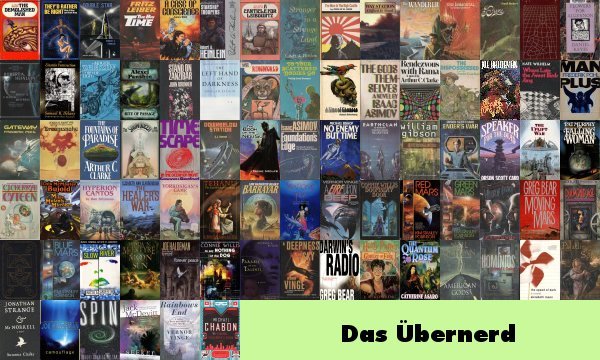 Little Nemo in Slumberland: Many More Splended Sundays
Little Nemo in Slumberland: Many More Splended Sundaysby Winsor McCay; edited by Peter Maresca
2009 Eisner Winner for Best Archival Collection/Project: Comic Strips
My immediate reaction on seeing Little Nemo in Slumberland: Many More Splendid Sundays was awe. I was unaware of the exact format of the original collection Many Splendid Sundays and while Amazon's listing for this book mentioned it was oversized I couldn't wrap my head around how big it was. Here's a photograph of the book with a slightly irritated cat to give you a sense of scale.
 I would say this book is huge but that's an understatement. I own huge books and Many More Splendid Sundays dwarfs them. It is by dimension the largest book I own by a wide margin. It's far larger than any of my shelves so I have to store it between bookshelves. I've only seen a handful of books on this scale ever.
I would say this book is huge but that's an understatement. I own huge books and Many More Splendid Sundays dwarfs them. It is by dimension the largest book I own by a wide margin. It's far larger than any of my shelves so I have to store it between bookshelves. I've only seen a handful of books on this scale ever.The point of this monstrously huge book is to present the Little Nemo in Slumberland strips in their original format. When they were first published the newspapers the strips took up a full page of the Sunday comics. All reprints since then have had to scale the images down to fit a more manageable size. Many More Splendid Sundays measures twenty-one inches by sixteen inches in order to present the artwork in a lavish style.
The reason I'm going on at length about this is that the size is the entire reason that Many More Splendid Sundays is notable. There are other collections of Little Nemo that are much more affordable for those interested in the strip but this and its predecessor are the only ones that capture the full artwork.
Little Nemo in Slumberland was a very early newspaper strip. How early? Here's the strip that was published one hundred years ago:

I'd use the strip that was one hundred years old this week but it contains a racial caricature that I wouldn't want to inflict on anyone who was unprepared for it (there is a reoccurring "jungle man" character who turns up).
The strips follow a simple format; Nemo wanders his dreams having adventures which conclude when something causes Nemo to wake up in the last panel. McCay's writing is clumsy at best and his dialog is so highly stylized that it is awkward. The real reason to check out Little Nemo is the stunning artwork. McCay was putting surrealism into the Sunday newspaper before surrealism was an artistic movement. He developed a touch for beautiful flowing panels where you can feel the motion captured between them. And his sense of design is terrific; I could examine these panels looking at the details all day. McCay was the first artistic genius in the medium of linear art.
The biggest problem with Many More Splendid Sundays is that the comic strips have already been mined for Many Splendid Sundays making this volume a kind of runner up to the original. Maresca does take advantage of a blank slate by running long sequences of strips where a storyline continued from week to week for several months. Still I found myself hoping for certain strips that I was familiar with to be included only to find out that they were in the first book.
This is a book to buy specifically for the packaging. Before Many More Splendid Sundays the only Little Nemo strips I had read were shrunk down so far you had to squint to make out the words. The selection of strips may not be the greatest but that has simply made me want to get the first volume. I'll cheerfully recommend it to anyone interested in Winsor McCay's art with the caveat that if you are not familiar with Little Nemo you'll want to examine the strips in a less expensive format first.


